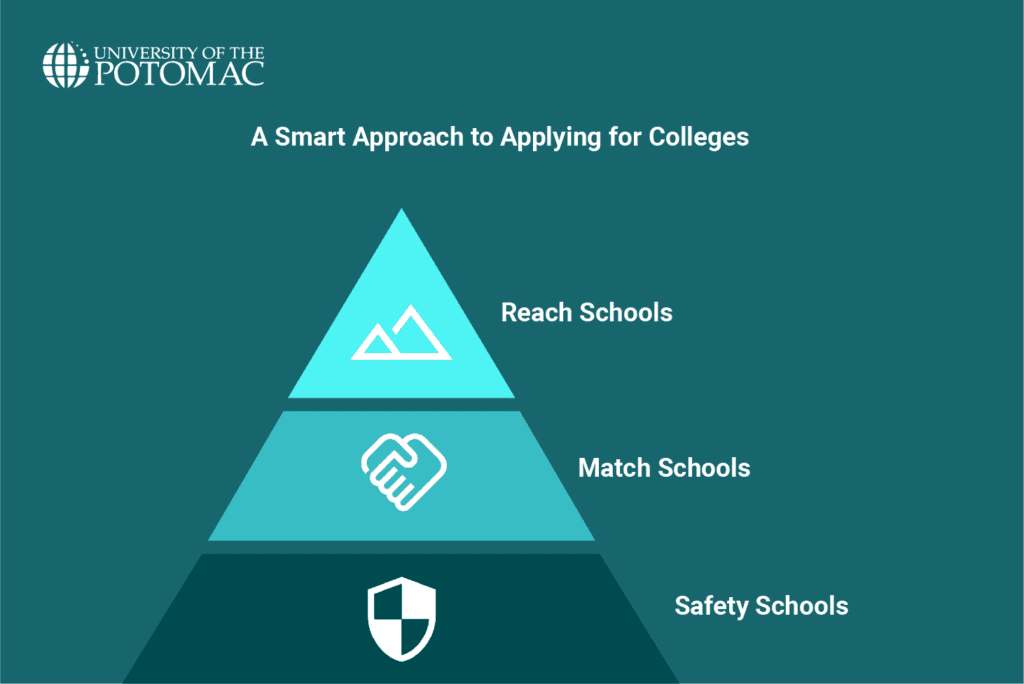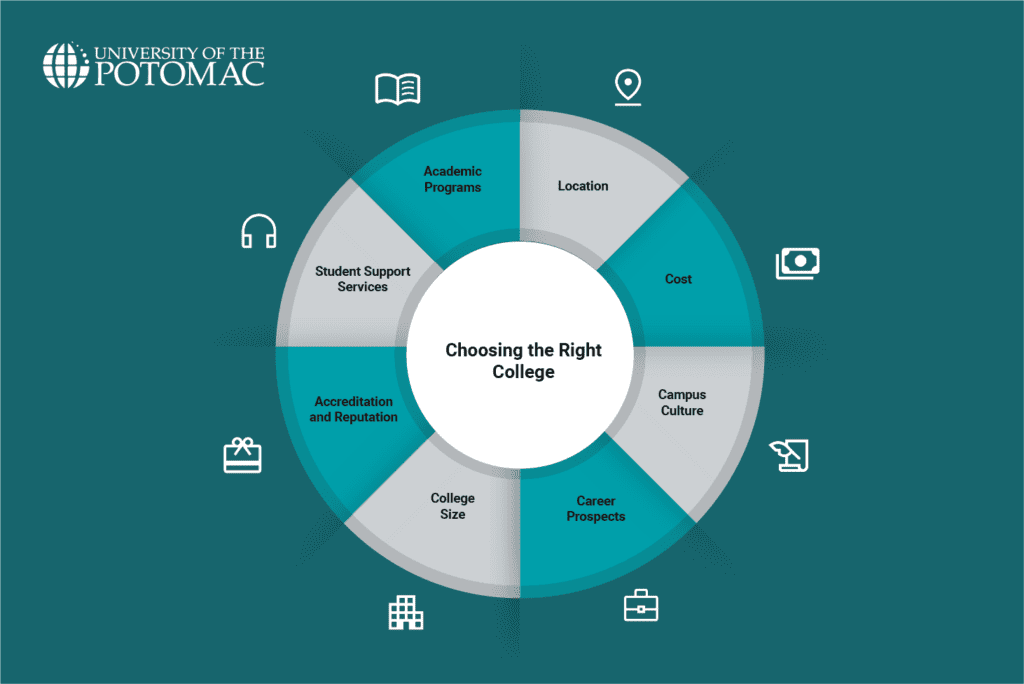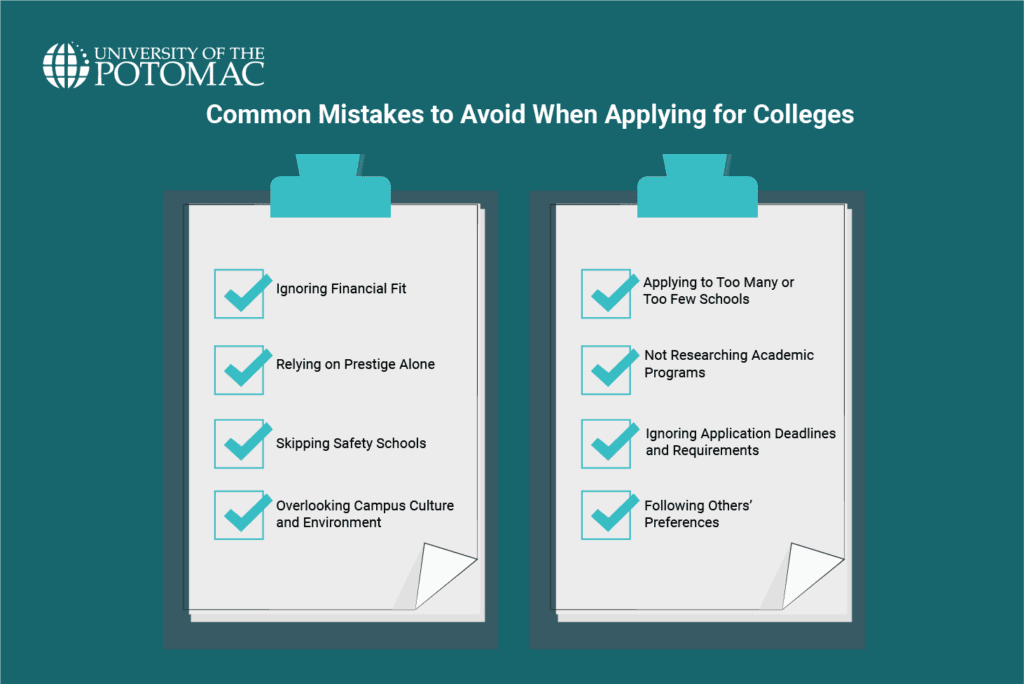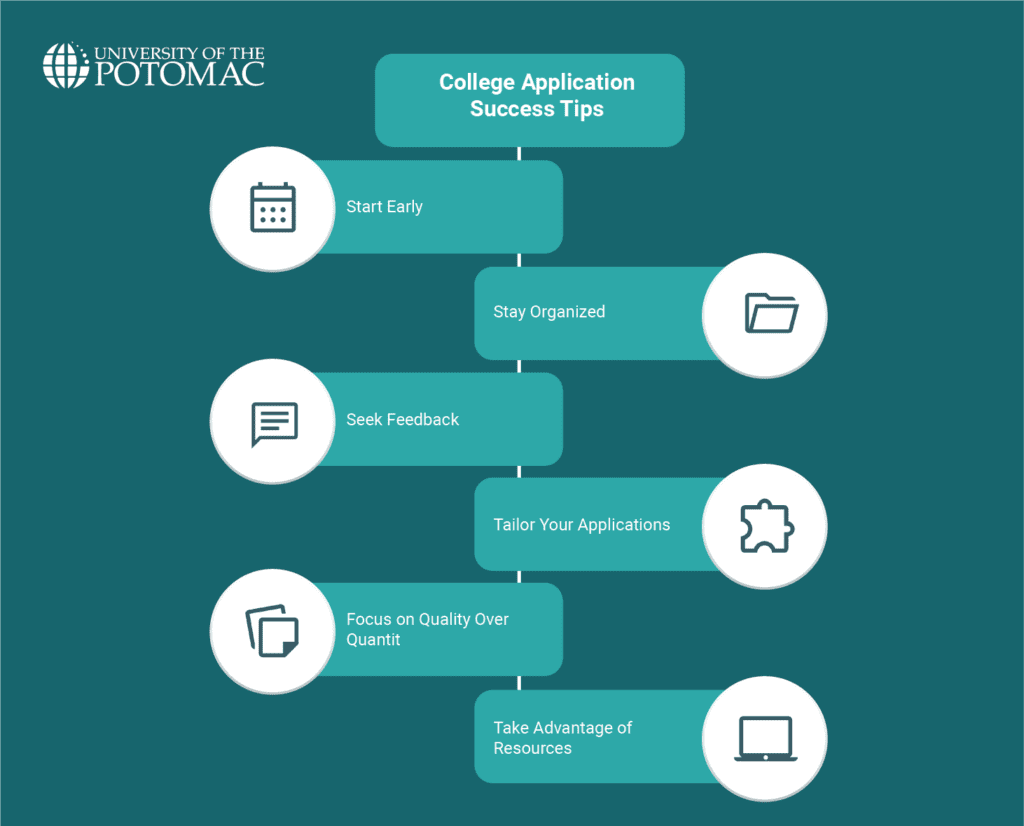- Balance is key: Apply to 6-12 colleges to ensure you have enough options without feeling overwhelmed, including a mix of safety, match, and reach schools.
- Research and narrow your list: Spend time researching each college’s academics, campus culture, and financial aid before narrowing down your list based on your goals and preferences.
- Avoid common mistakes: Be mindful of financial fit, prestige, and campus culture when making decisions. Apply to a balanced list of schools and avoid applying to too many or too few.
- Tips for success: Start early, stay organized, and tailor your applications to each school to improve your chances of success.
Higher education is an important step that can open doors to new opportunities and help shape your future. For many students, picking the right college is a big decision that can impact their goals and career.
One common question that comes up is: How many colleges should I apply to? A well-thought-out college list can help you make the best decision without feeling overwhelmed.
This article will help you create a balanced college list, including safety, match, and reach options. We’ll cover how to build, research, and narrow down your list while also sharing common mistakes to avoid and tips for success in the application process.
How Many Colleges Should I Apply To?
Although there is no right number, most students stick to 6-12 colleges. You’ll have enough options in this range without making the process too stressful. If you apply to too few schools, you might limit your choices, but applying to too many can take up too much time and energy.
Below is a simple list to help you narrow the number of applications in the range mentioned above.
Build your college list
As a first step, you’ll need to make a list. As this is only the beginning of the process, don’t be afraid to start with a longer list of schools to explore all your options. Check out a variety of schools and their size, location, and how competitive they are to not miss out on any good opportunities.
When compiling this list, keep in mind your interests, goals, and qualifications in terms of what programs a college offers, the campus environment, and their location.
Research the colleges
As a next step, research colleges to find the right fit for you. You can easily do this by visiting their websites to learn more about academics, location, size, extracurriculars, and financial aid.
Next, check out the institution’s location and size, as well as campus activities like clubs and sports for extracurriculars. Use the school’s calculator to estimate the cost of your studies and then check for scholarships and grants. Lastly, take a campus tour to see how everything works there.
Narrow down your college list
Now that you have your list filled with details on what each can offer, it is time to narrow down this information needs by comparing them to your goals, interests, and aspirations for the future.
As you narrow your list, focus only on schools that match your preferences, goals, and budget. Think about some of the qualities your dream college must have and filter your list based on that.
A Smart Approach to College Application

Another very useful and equally important thing is to divide your list of colleges into three categories: safety schools, match schools, and reach schools. Let’s explain what each of these categories means and how they help you create a balanced list.
Safety schools
A safety school is one where you have a higher chance of getting accepted because your academic record (i.e., GPA, test scores, etc.) exceeds the averages of typically admitted students. These kinds of schools are something you fall back on, a backup plan if none of the other options work out.
It’s important to pick safety schools you genuinely like and would be happy to attend. This way, no matter what happens, you’ll have a fulfilling college experience.
Match schools
A match or target school for you would be one where your academic qualifications, like the GPA and test scores, closely align with the institution’s average admitted student profile. This means that though the school can be competitive, you still have a good chance of being accepted.
Like safety schools, match schools should also align with your academic, social, and financial needs.
Reach schools
Reach schools are colleges where you have a lower chance of getting accepted because your academic qualifications are lower than most accepted students, or the school is hard to get into because it’s very selective. Reach schools usually have highly selective requirements, such as strong essays, impressive extracurricular activities, or very high test scores.
Even though applying for these schools can feel daunting, it is important to include a couple of ambitious options on your list—as they say, shoot for the stars, aim for the moon.
To apply to such schools, preparation is key. Start by researching their requirements and identifying areas where you can improve, such as raising test scores, enhancing your essays, or showcasing leadership roles in extracurricular activities.
Key Factors to Consider When Choosing Colleges

As college is a big decision in life (you will spend four years of your life there building yourself up for a career that will follow you throughout your life), it is essential to consider some factor.
First and foremost, you need to consider the academic programs they offer. Does the college offer a program that matches your interests? What kind of accreditation do they have? What courses and internships do they provide?
Next, consider where the university is located and how it will affect your daily life, job prospects, and comfort. Alongside this, you should also consider their campus environment. Are there any student organizations? How diverse is the student body of the college? These answers are key to ensuring you attend a college that enriches your knowledge while also matching with your lifestyle.
One KEY element in picking your college is understanding how much it costs to attend the university, including the tuition fee, accommodation, and living expenses. Here, try to understand what kind of scholarships and financial aid are available for you to finance your studies.
Another important element that shouldn’t be overlooked is college size, specifically class size. If you thrive in small groups, a college with a smaller class size can be ideal. Also consider the student-to-faculty ratio, as this helps you determine how much attention and support you can get from your professors.
Interested in pursuing a degree?
Fill out the form and get all admission information you need regarding your chosen program.
This will only take a moment.
Message Received!
Thank you for reaching out to us. We will review your message and get right back to you within 24 hours.
If there is an urgent matter and you need to speak to someone immediately you can call at the following phone number:
- We value your privacy.
Common Mistakes to Avoid
For sure, there are some really good colleges that, based on academics and campus life, might seem like the perfect fit for you. However, they might be too pricey for you. Ignoring such an important factor can lead to financial strain or heavy student loans. To avoid this, research tuition, fees, and living expenses early on. You can do this by using net price calculators.
Some students make the mistake of applying to colleges just because they’re famous or because everyone else is doing so. Keep in mind that a school’s good reputation and ranking might not always match your needs and goals. So, instead of going for the prestige, focus on schools that have strong programs that interest you, a supportive environment, and resources to match your goals.

Another common mistake is researching the academic programs a college offers without considering campus atmosphere, location, or student life. All of these factors are big contributors to the college experience, and dismissing them will lead to dissatisfaction.
Everyone knows that applying for college takes time and effort, and applying to too many schools will definitely tire you out. However, applying to too few schools limits your options. To avoid such a thing, make sure you follow the tips we provided above on building your list of colleges to apply to.
Last but not least, remember to mark application deadlines and requirements, as this can lead to disqualification. The best practice is to add the deadlines to your calendar and create lists for each application with the required documents and steps to finalize it.
Top Tips for College Application Success

The whole process of researching, picking, and applying for colleges can be overwhelming for new students. However, with the right approach in your application process, you can set yourself up for success.
First, start by preparing your applications months before the deadlines to ensure you have plenty of time to gather materials, write essays, and make revisions. As each application will have a list of tasks to complete, keep a checklist of every college’s requirements, setting deadline for each of these steps. This way, you can avoid last-minute stress or missing deadlines altogether.
A fresh pair of eyes is always welcome, as it can help you identify your blind spots. After you’ve prepared your applications and written your essays, ask for feedback from your teachers, mentors, or counselors, and incorporate them into your application.
Also, don’t just use the same application for every college you apply to. Instead, customize your application for each school to highlight how your goals and interests align with their programs and values.
If you are still on the verge of deciding which colleges to apply to, take advantage of the plethora of resources colleges offer. College websites, virtual tours, and counseling services are good places to gather information about colleges.
Conclusion
Planning carefully and balancing your choices is important to make sure you have good options without feeling too stressed. The application process can be tough, but if you follow the tips and avoid common mistakes, you’ll stay on track. By starting early, staying organized, and choosing schools that match your goals, you’ll feel more confident and improve your chances of getting into the college you want.
Frequently Asked Questions
Do you have to tell colleges that you are not attending?
Yes, it’s courteous to inform colleges you’re not attending so they can offer your spot to another student.
What happens if I accidentally apply to a college twice?
The college will usually process one application and may contact you for clarification; it won’t hurt your chances.
Do colleges know how many other colleges you applied to?
No, colleges do not know how many or which other colleges you’ve applied to unless you tell them.










